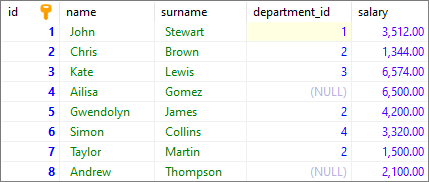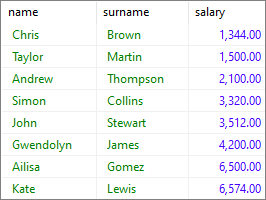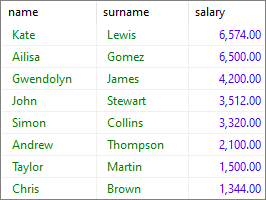EN
MS SQL Server - sort in ascending or descending order
0
points
In this article, we would like to show you how to sort records in ascending and descending order in MS SQL Server.
Quick solution:
SELECT [column1], [column2], [columnN]
FROM [table_name]
ORDER BY [column1], [column2], [columnN] ASC;
SELECT [column1], [column2], [columnN]
FROM [table_name]
ORDER BY [column1], [column2], [columnN] DESC;
Practical example
To show how to sort records in ascending and descending order, we will use the following table:

Note:
At the end of this article you can find database preparation SQL queries.
Example 1
In this example, we will display information about the users in ascending salary order.
Query:
SELECT [name], [surname], [salary]
FROM [users]
ORDER BY [salary] ASC;
Result:

Example 2
In this example, we will display information about the users in descending salary order.
Query:
SELECT [name], [surname], [salary]
FROM [users]
ORDER BY [salary] DESC;
Result:

Database preparation
create_tables.sql file:
CREATE TABLE [users] (
[id] INT IDENTITY(1,1),
[name] VARCHAR(50) NOT NULL,
[surname] VARCHAR(50) NOT NULL,
[department_id] INT,
[salary] DECIMAL(15,2) NOT NULL,
PRIMARY KEY ([id])
);
insert_data.sql file:
INSERT INTO [users]
( [name], [surname], [department_id], [salary])
VALUES
('John', 'Stewart', 1, '3512.00'),
('Chris', 'Brown', 2, '1344.00'),
('Kate', 'Lewis', 3, '6574.00'),
('Ailisa', 'Gomez', NULL, '6500.00'),
('Gwendolyn', 'James', 2, '4200.00'),
('Simon', 'Collins', 4, '3320.00'),
('Taylor', 'Martin', 2, '1500.00'),
('Andrew', 'Thompson', NULL, '2100.00');